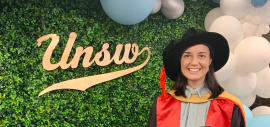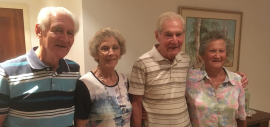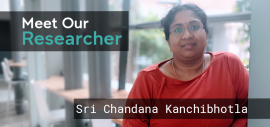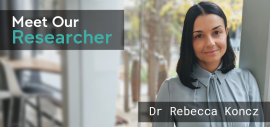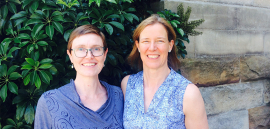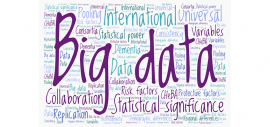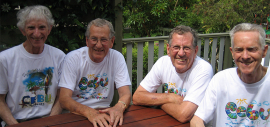Blog: The Brain Dialogues, filtered by tag: Older Australian Twins Study
PhD Students Excel at CHeBA
HEIDI DOUGLASS | h.douglass@unsw.edu.au
The breadth of research groups and studies at CHeBA make it a leader in the global epidemiology of dementia, with the data available making the Centre a rich resource for not just researchers, but also students.
According to the Co-Directors of CHeBA, Professor Perminder Sachdev and Professor Henry Brodaty, the calibre of students the Centre has supported has been outstanding.
Recent PhD graduate, Dr Rebecca Koncz, is no exception. Dr Koncz led a world first study using data from CHeBA’s long-standing Older Australian Twins Study, using a brain… Read More
A Thing or Two About Twins
HEIDI DOUGLASS | h.douglass@unsw.edu.au
Throughout history, twins have been a source of fascination and wonder – particularly the unique bond they share compared to other sibling relationships.
Jan Rumery with her twin brother, John Day
For academics, twins provide an invaluable source of information, because the similarity in their genetic code allows researchers to pull apart and examine genetic and environmental influences. Twin studies have been influential in the discovery and treatment of diseases and disorders.
Researchers in CHeBA’s Older Australian Twins Study have delved into… Read More
Sri Chandana Kanchibhotla | Meet Our Researcher Series
Understanding genetics of ageing and age-related disorders are Research Officer Chandana Kanchibhotla’s main research interests. With a background in biotechnology, Chandana’s ultimate hope is for her research area to gain a better understanding of ageing from a genetics perspective – at the molecular level.
How did you get into researching the ageing brain?
I am from Hyderabad in India, where I completed my Masters in Biotechnology from Osmania University. My interest in genetics started during my time at high school, largely thanks to a passionate biology teacher, who inspired my… Read More
Dr Amanda Selwood | Meet Our Researcher Series
Dr Amanda Selwood is relatively new to CHeBA; having had the unusual experience of commencing a new job without in-office contact. However, Dr Selwood has found a sense of belonging through engaging with CHeBA’s campaigns, in particular the #InThisTogether social media campaign which featured snapshots of CHeBA’s researchers sending messages of support to our study participants, colleagues and broader CHeBA community.
How did you get into researching the ageing brain?
I completed my PhD in Cognitive Science at Macquarie University. I was looking at twin and sibling relationships and how… Read More
Dr Rebecca Koncz | Meet Our Researcher Series
Dr Rebecca Koncz’s research explores the pathophysiological mechanisms of Alzheimer’s disease, particularly amyloid accumulation, as a hallmark feature of the disease. Utilising data collected from CHeBA’s Older Australian Twins Study, she is attempting to answer the classic “nature vs nurture” question – specifically, what proportion of amyloid burden is attributable to genes, and what proportion is determined by environmental, or modifiable, risk factors.
How did you get into researching the ageing brain?
I’ve always had an interest in the brain sciences, having completed a major in… Read More
Dr Vibeke Catts | Meet Our Researcher Series
Twin research provides important clues to understanding cognitive decline in older adults and assists in the development of public health intervention strategies. Dr Vibeke Catts, Study Coordinator of CHeBA’s Older Australian Twins Study hopes to identify genetic changes between twins to identify the biological pathways for diseases such as dementia. This particular longitudinal study has brought together geneticists and researchers in neurospsychiatry of the elderly to examine key issues in cognitive ageing and dementia.
How did you get into researching the ageing brain?
My former… Read More
Findings from the Older Australian Twins Study
HEIDI DOUGLASS | h.douglass@unsw.edu.au
Established by CHeBA staff in 2007, the Older Australian Twin Study (OATS) is the largest and longest running Australian research study of its kind investigating healthy brain ageing. By studying older twins (aged 65+ years) over time, OATS allows researchers to investigate the complex interactions between multiple genetic and environmental factors which cause brain diseases. Over the last decade, OATS has generated over 32 published papers and contributed to 8 international consortia, providing valuable insights into healthy brain ageing and age-… Read More
Exploiting Big Data for Dementia Research
PROFESSOR PERMINDER SACHDEV
This article was first published in InformAge, Volume 2, Issue IV December 2015 (Summer).
Dementia is a global problem, and there is a worldwide effort to identify risk and protective factors, determine early biomarkers, and develop novel treatments for dementia. A survey of the international research scene reveals that many groups are working in relative isolation on projects that are similar to research conducted elsewhere. Very often, the individual projects are not large enough to provide conclusive answers to complex research questions. A recent… Read More
Doubling the Data Through Twins Research
KATE CROSBIE and HEIDI DOUGLASS | h.douglass@unsw.edu.au
For John Stapleton, the best thing about being a twin was never being bullied at school: “There were always two of us to fight”. For Terry Stapleton, it’s the “stronger bond” between twins; that, and meeting John for a beer most Fridays at The Oaks in Neutral Bay. Both twins maintain a physically and mentally active life, but in different ways. These differences, as well as their similarities, are helping CHeBA researchers understand the role of genetic and environmental factors in cognition and healthy ageing.
John and Terry… Read More
Donating Your Brain to Research
HEIDI DOUGLASS | h.douglass@unsw.edu.au
There are currently approximately 320,000 people in Australia with dementia, with that number set to rise to almost one million by 2050, and 115 million globally. These predictions mean that not only do we need a clear plan to make care available for so many people with dementia, but we also need to pursue prevention strategies vigorously.
Prevention of dementia depends largely upon research, and beyond the necessities of funding, equipment, and academics with the right skill base to perform the research we need one extra thing: brains.
"Even before… Read More
